Refine search
Actions for selected content:
27 results

Science Denial
- Post-Truth or Post-Trust?
-
- Published online:
- 14 November 2025
- Print publication:
- 20 November 2025
-
- Element
- Export citation
14 - An Ecological Approach to Manipulation, Influence and Deception
- from V - Discussion
-
-
- Book:
- Manipulation, Influence and Deception
- Published online:
- 10 June 2025
- Print publication:
- 24 April 2025, pp 297-312
-
- Chapter
- Export citation
Chapter 11 - Final Comments
-
- Book:
- Politicians Manipulating Statistics
- Published online:
- 31 May 2025
- Print publication:
- 03 April 2025, pp 241-252
-
- Chapter
- Export citation
Introduction: Populists, Demagogues, Language
-
- Book:
- Brexitspeak
- Published online:
- 22 November 2024
- Print publication:
- 05 December 2024, pp 1-21
-
- Chapter
- Export citation
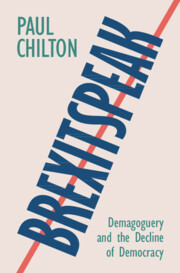
Brexitspeak
- Demagoguery and the Decline of Democracy
-
- Published online:
- 22 November 2024
- Print publication:
- 05 December 2024
Chapter 2 - Epistemology
-
- Book:
- Pragmatism and Methodology
- Published online:
- 04 January 2024
- Print publication:
- 25 January 2024, pp 26-48
-
- Chapter
-
- You have access
- Open access
- HTML
- Export citation
4 - Post-Truth Won’t Set Us Free
- from Part I - The Health Care System That COVID-19 Encountered
-
-
- Book:
- COVID-19 and the Law
- Published online:
- 27 October 2023
- Print publication:
- 09 November 2023, pp 58-72
-
- Chapter
-
- You have access
- Open access
- HTML
- Export citation
Chapter 2 - The Legal and Ethical Status of Social Media
- from Section 1 - Understanding Social Media
-
-
- Book:
- Social Media and Mental Health
- Published online:
- 11 October 2023
- Print publication:
- 12 October 2023, pp 12-22
-
- Chapter
- Export citation
Introduction
-
- Book:
- Stanley Cavell's Democratic Perfectionism
- Published online:
- 17 August 2023
- Print publication:
- 31 August 2023, pp 1-25
-
- Chapter
- Export citation
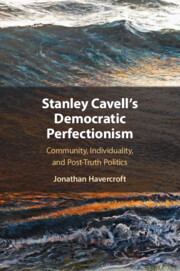
Stanley Cavell's Democratic Perfectionism
- Community, Individuality, and Post-Truth Politics
-
- Published online:
- 17 August 2023
- Print publication:
- 31 August 2023
4 - The Fourth Generation of Informational Warfare
-
-
- Book:
- Rethinking Warfare in the 21st Century
- Published online:
- 29 June 2023
- Print publication:
- 13 July 2023, pp 79-112
-
- Chapter
- Export citation
4 - The Truth Factory
- from Part II - The Truth Factory
-
- Book:
- The Making Sense of Politics, Media, and Law
- Published online:
- 06 April 2023
- Print publication:
- 13 April 2023, pp 63-91
-
- Chapter
-
- You have access
- Open access
- HTML
- Export citation
Chapter 25 - Salman Rushdie and Postmodernism
- from Part IV - Critical Theoretical Contexts
-
-
- Book:
- Salman Rushdie in Context
- Published online:
- 23 March 2023
- Print publication:
- 30 March 2023, pp 318-328
-
- Chapter
- Export citation
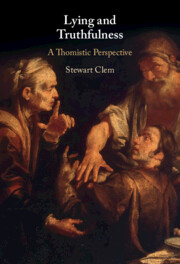
Lying and Truthfulness
- A Thomistic Perspective
-
- Published online:
- 22 December 2022
- Print publication:
- 05 January 2023
3 - Epistemic Communities of Practice
- from Part II - Key Concepts of IR Scholarship
-
-
- Book:
- Conceptualizing International Practices
- Published online:
- 09 June 2022
- Print publication:
- 23 June 2022, pp 47-76
-
- Chapter
- Export citation
7 - Refugees and Their Allies as Agents of Progress
-
-
- Book:
- Theorizing World Orders
- Published online:
- 18 November 2021
- Print publication:
- 25 November 2021, pp 169-207
-
- Chapter
- Export citation
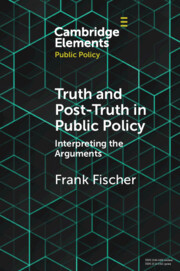
Truth and Post-Truth in Public Policy
-
- Published online:
- 18 November 2021
- Print publication:
- 09 December 2021
-
- Element
- Export citation
Introduction
-
- Book:
- Pragmatist Truth in the Post-Truth Age
- Published online:
- 14 September 2021
- Print publication:
- 23 September 2021, pp 1-11
-
- Chapter
- Export citation
Chapter 1 - James’s Children?
-
- Book:
- Pragmatist Truth in the Post-Truth Age
- Published online:
- 14 September 2021
- Print publication:
- 23 September 2021, pp 12-39
-
- Chapter
- Export citation
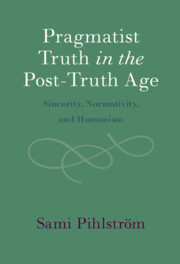
Pragmatist Truth in the Post-Truth Age
- Sincerity, Normativity, and Humanism
-
- Published online:
- 14 September 2021
- Print publication:
- 23 September 2021
